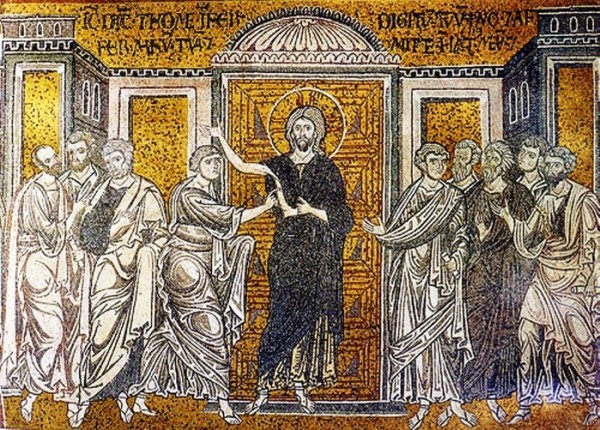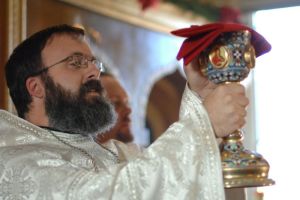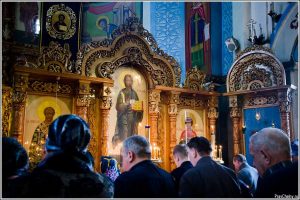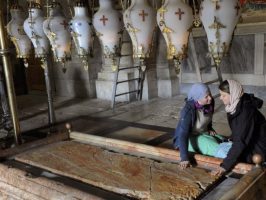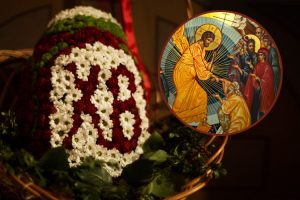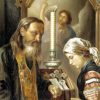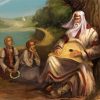I am sure many of us experience what I have come to call the “post-Paschal funk.” We spend long hours in church during the Great Fast and Holy Week. We experience the intensisty of the Lord’s final days in Jerusalem. We stand at the foot of the Cross and see him laid in the tomb. We experience the palpable joy of our Lord’s resurrection from the dead. We feast together in our own resurrection with Christ and then, the let down. We have a hard time keeping the Paschal joy intact. Liturgically, Bright Week in parish life is rarely observed. A repeat of the Paschal Liturgy is called for everyday as well as Paschal Matins and Vespers. It is hard to sustain another week of a full liturgical cycle in a parish context, but the result is that we can very easily sink into the “post-Paschal funk”. Just like a young kid on Christimas, we open all the presents and then are somehow let down once they are all opened.
How are we to keep the joy of Pascha alive within our hearts after Pascha, and, for that matter, the whole year? We go through times of doubt, despair, difficulties, and somehow the Bright Light of Pascha begins to fade and we again find ourself standing not at the empty tomb of Christ but back to Holy Saturday, that unique moment between death and resurrection.
Thank God that the Church, inspired by the Holy Spirit, has given us many days to continue pondering and feasting the resurrection of Christ. This is why we are given Thomas Sunday as the first Sunday after Pascha. The Church knows how quickly we forget, how quickly we fall into the darkness of doubt and how that can squeeze out all of the joy of the resurrection.
Thomas the Apostle is sometimes called the doubter but, if we remember and are attentive to the Holy Gospels, we see that he was also the one who, as Metropolitan Anthony Bloom reminds us,
“when the Apostles and the Lord heard of the illness of Lazarus, Christ said to them: Let us return to Jerusalem. To which the others said: But the Jews wanted to kill you there. Why should we return? Only Thomas the Apostle answered: Let us go with Him and die with Him. He was prepared not only to be His disciple in words, not only to follow Him as one follows a teacher, but to die with Him as one dies with a friend and, if necessary, for a friend. So, let us remember his greatness, his faithfulness, his wholeness.”
Saint Thomas was faithful and his doubt becomes the very means by which we all have come to behold the resurrection of Christ. In fact the hymns even praise his doubt:
The Disciples were assembled on the eighth day,
and the Savior appeared to them.
He gave them peace and said to Thomas:
“Come, Apostle! Feel my hands, which were pierced by the nails!”
Most wonderful doubt of Thomas!
It brought the hearts of the faithful to knowledge.
And with fear he cried: “My Lord and my God, glory to You!
O most glorious wonder!
Doubt bore certain faith!
The Lord confirmed Thomas in faith through his doubt. We read this in the Gospel given for this Sunday”
“And after eight days His disciples were again inside, and Thomas with them. Jesus came, the doors being shut, and stood in the midst, and said, “Peace to you!” Then He said to Thomas, “Reach your finger here, and look at My hands; and reach your hand here, and put it into My side. Do not be unbelieving, but believing.” And Thomas answered and said to Him, “My Lord and my God!”Jesus said to him, “Thomas, because you have seen Me, you have believed. Blessed are those who have not seen and yet have believed.”
The other theme given to us for this particular Sunday is the closed doors. Christ appears to His disciples even though the doors were shut. The closed doors through which Christ appears are linked to the sealed tomb through which Christ has shown forth:
From the sealed tomb, You shone forth, O Life!
Through closed doors You came to Your Disciples, O Christ God.
Renew in us, through them, an upright spirit,
by the greatness of Your mercy, O Resurrection of all!
It is always striking to close the doors before Vespers on Thomas Sunday Vespers. The service books instruct us to close all of the doors of the iconostas that have been open all of Bright Week before 9th hour before the Vespers of Thomas Sunday. Then we hear all of the references to the closed doors through which Christ appears. Then it dawns on us – Christ can manifest Himself to us even when our doors are shut. Is this not the key to the joy of Pascha remaining with us. We recall lines from the lamentations from the Matins of Holy Saturday as we stand at the sealed tomb:
Oh Life how canst Thy die, how can Thou dwell in a narrow tomb?
When you were placed in a tomb, O Christ the foundations of hell shook and the graves of the dead ere opened.
Thou didst descend to earth so that you might save Adam, not finding him on earth, O Master Thou didst descend as far as Hades in search of him.
O the joy, O the boundless delight, with which you filled those who lay bound in hell, when you made light blaze throughout its murky depths.
Thy tomb O Christ is the fountain of our resurrection!
Christ indeed comes searching for us, even in our doubt, even in our “post-Paschal funk”. He comes to us even though the doors of hearts are shut, even when we are in a terrible place and have closed our doors – He still comes. We put our hands in the wounds in His hands and we touch his side. He comes to dispel all sorrow and sadness. Again from the services of Thomas Sunday:
O Lord, shining with the splendor of Your divinity,
You came through closed doors to Your Disciples,
showing Your pierced side, the wounds from the nails,
dispelling all sadness and sorrow!
O friends, see that I am not a spirit, but truly man!
You commanded the disbelieving Disciple to look,
saying: “Prove to yourself, then come and believe!”
He touched Your side with his own hand and cried in faith and fear:
“My Lord and my God, glory to You!”
Christ’s coming to the disciples through closed doors is the effect of Christ’s resurrection. What He accomplished through the power of His resurrection is still being accomplished today. Pascha is not merely a commemoration of an event in the past but one in which we continue to participate in daily. Christ comes to us every day. He comes to us today through closed doors.
Christ’s death and resurrection is our death and resurrection. We are dead and Christ comes to bring us back to life again. It is entering again and again into our baptism into Christ. Olivier Clement reminds us,
“Life in the spirit means gradually becoming aware of ‘baptismal grace,’ and this awareness transforms the whole person, Each present moment has to become baptismal: a moment of anguish and death if I seek to cling to it and so experience its non-existence, but a moment of resurrection if I accept it humbly as ‘present’ in both senses of the word. … We come finally to the moment of agony when we are overwhelmed by the waters of death. Through our baptism, according to the measure of our faith, they will be transformed into the womb of eternity.”
Each day may we continue to rejoice in our Lord’s resurrection. May we continue to offer our praise and glory and even offer our glorious doubt like Thomas. Christ continues to come to us even though the doors are shut and leads us to deeper faith in Him. He not only offers His hands and His side but allows us to be partakers of Himself in His Holy Mysteries. O most glorious wonder! As we sing from the depths of our hearts as we did on that Brigh night:
This is the day of resurrection, let us rejoice, o people. The Pascha, the Pascha of the Lord. For from death to life and from earth to heaven has Christ led us, as we sing the hymn of victory!












